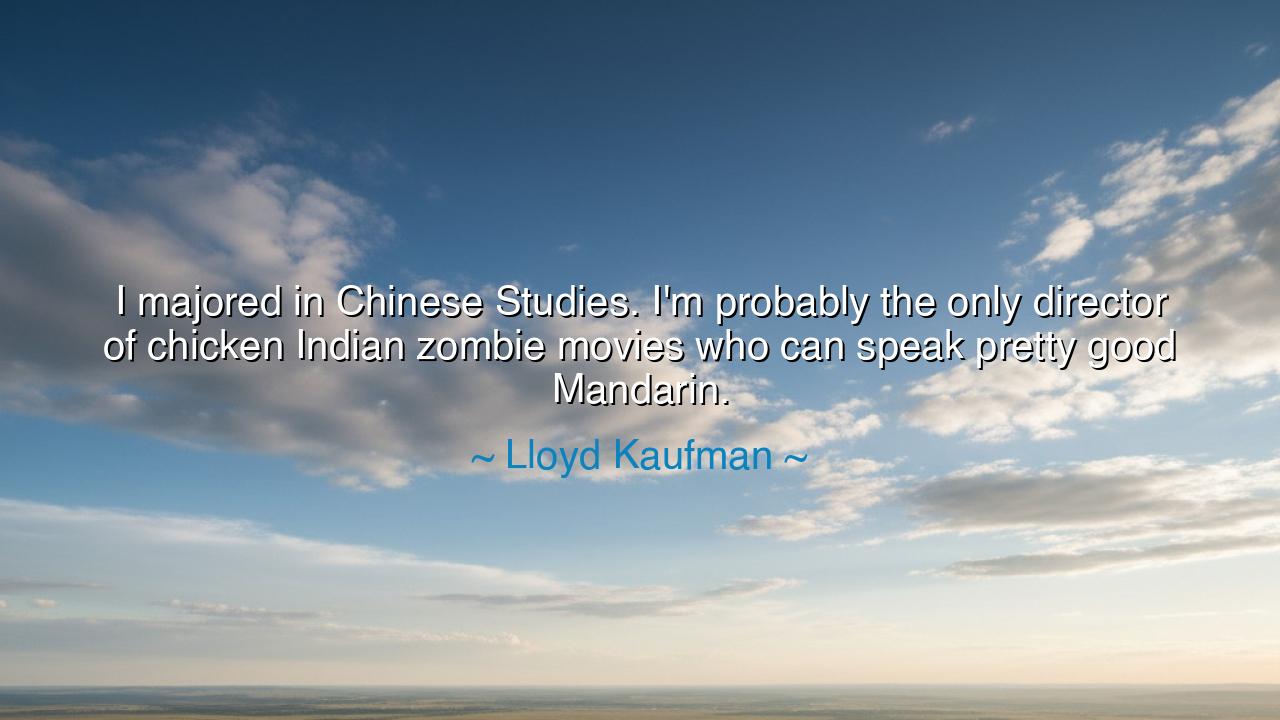
I majored in Chinese Studies. I'm probably the only director of
I majored in Chinese Studies. I'm probably the only director of chicken Indian zombie movies who can speak pretty good Mandarin.






Lloyd Kaufman’s words, "I majored in Chinese Studies. I'm probably the only director of chicken Indian zombie movies who can speak pretty good Mandarin," are filled with humor and self-awareness, yet they carry a deeper meaning about the importance of diverse knowledge and unexpected connections in shaping our lives and careers. Kaufman, known for his unconventional films, such as the Toxic Avenger and various B-movies, highlights how his background in Chinese Studies gives him a unique perspective in an industry not typically associated with linguistic diversity or academic rigor. Kaufman’s reflection serves as a reminder that the pursuit of knowledge, no matter how seemingly unrelated to one’s profession, can create unexpected advantages and open doors to new creative possibilities.
In the ancient world, the idea of cross-disciplinary knowledge was not only respected but sought after. The Greeks, for instance, celebrated the philosopher-king, a ruler who was not just a political leader but someone who had deep knowledge of philosophy, mathematics, science, and the arts. Plato’s Academy and Aristotle’s Lyceum were not just schools for philosophy—they were institutions where different branches of knowledge were seen as interconnected. A true scholar was one who understood the world in its complexity, who could synthesize ideas from various fields and apply them to solve problems and understand the human condition. Kaufman’s diverse education, while humorous in its specific context, is akin to the ancient philosophers who did not limit themselves to one narrow path but sought a broader understanding of life.
Confucius, the great philosopher of China, understood the importance of broad education and practical application. His teachings extended beyond ritual and ethics to include the importance of understanding the arts and the human condition. In his book The Analects, he speaks of learning not as a process of rote memorization, but as a journey to better understand the world and to bring out the best in oneself. Kaufman’s academic pursuit of Chinese Studies is an echo of Confucian wisdom—an effort to understand a culture deeply, even if that knowledge seems far removed from the world of movie-making or entertainment. Just as Confucius believed that knowledge should be applied to make one a better person and a better leader, Kaufman’s study of a foreign language and culture might influence the creative choices he makes, even in a world so seemingly distant from academic scholarship.
The idea that unexpected knowledge can enrich one’s creative work is not unique to Kaufman. Consider Leonardo da Vinci, who was not just an artist but a scientist, engineer, and anatomist. Da Vinci’s Renaissance genius stemmed from his ability to draw from various disciplines, applying his understanding of anatomy to his paintings and his knowledge of mechanics to his inventions. This blending of the intellectual and the creative enabled him to create works of art that were revolutionary in their depth and precision. Kaufman’s statement, though lighthearted, underscores a similar truth—that the more one broadens their intellectual horizons, the more tools they have to shape and influence their work.
In the same way, ancient travelers and explorers, like Marco Polo, expanded the boundaries of human knowledge. Polo’s travels to China opened up new worlds to the West, bridging cultures and creating a broader worldview that reshaped Western thought. Polo did not simply document his travels—he integrated his experiences into a larger understanding of the world’s interconnectedness. Kaufman, though in a different time and space, shows how knowledge of Chinese culture and language can intersect with his film-making, and in doing so, creates something new and unexpected. His journey into the world of Chinese Studies might seem unrelated to his career, but in truth, it is a reflection of the ancient spirit of exploration, where learning about one world allows you to bring that knowledge into another, transforming it in the process.
The deeper lesson in Kaufman’s words is one of openness to diverse forms of learning and thinking. Kaufman’s unique path shows that knowledge—whether it’s Chinese Studies, philosophy, or art—is never wasted, even if it seems disconnected from one’s immediate profession or passion. In fact, the more diverse your knowledge, the more flexible and creative your mind becomes. We see this throughout history, as individuals who draw on multiple fields of expertise are able to innovate and create in ways that are inaccessible to those who limit themselves to a single path. Kaufman’s ability to bring a deeper, broader knowledge to his seemingly absurd films is a reflection of how a multifaceted approach to life can yield unexpectedly profound results.
As you journey through your own life, remember that learning is not confined to one path. Seek out knowledge from many sources, even those that seem unrelated to your current goals. Just as Kaufman’s study of Chinese Studies enriches his creative work, so too can your own knowledge of diverse subjects influence and enhance the work you do, no matter how different from your original pursuits. Never limit your learning to the traditional boundaries set by society or profession. Allow your curiosity to lead you, and know that each piece of knowledge you gather will be a tool that enriches your life, expands your creativity, and shapes your unique perspective. Just as Leonardo da Vinci or Marco Polo brought new understanding to their worlds, so too can you use your broad knowledge to shape the world around you, in ways you may not yet imagine.






AAdministratorAdministrator
Welcome, honored guests. Please leave a comment, we will respond soon